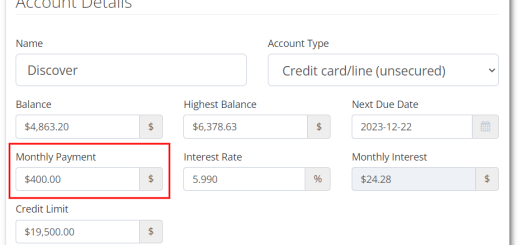Should College Students Have Credit Cards?
When you are in college, the choices you make can impact your financial future. Beyond traditional student loans, most college students are presented with credit card offers. But should college students have credit cards?
Whether or not you choose to open a credit card in college will come down to your personal preferences and financial situation. There are advantages and disadvantages to opening a credit card while you are still in school.
Let’s take a closer look to help you make the right choice for your future.
Can College Students Open Credit Cards?
First things first, can college students open a credit card? The answer is yes.
In most cases, students will have the opportunity to open a credit card. Sometimes, the student will need a consigner to open up their first credit card account.
Once the account is opened, college students can use the card to cover expenses.
Pros of Opening a Credit Card as a College Student
There are many reasons why college students should open a credit card while they are in school. Here are some of the benefits.
Learn How to Manage Credit Responsibly
A credit card can teach students how to use credit responsibly and master smart money practices. Responsible credit management requires students to manage a monthly budget and monitor their spending to stay on track.
Additionally, a credit card can help students learn the importance of making on-time payments each month.
Since most college students are given a low credit limit when they first open a credit card, this restriction can help them learn the ropes. Hopefully, the manageable credit limit will help keep spending in check as they learn how to use credit responsibly.
Plastic Makes It More Secure to Shop
While you can use a debit card to tap into the convenience of plastic, credit cards often come with built-in security measures to protect your funds against fraud.
Additionally, you won’t have to worry about the risks of carrying cash. If your credit card is stolen, you can simply cancel the card and avoid having to pay for unauthorized charges. However, if your cash is stolen, you can’t get it back.
Cover Emergencies
If you run into a financial emergency, the last thing you want to do is scramble to pay for it. With the help of a credit card, you will have a way to fund potential emergencies.
It is important to note that you will have to pay back the funds with interest. Since credit cards often come with very high interest rates, it can be expensive to use a credit card to cover emergency expenses. As a result, it is critical to understand the difference between an emergency and a non-emergency before you get a credit card.
For example, funding an unexpected car repair is an emergency. But paying for a brand new textbook may not count as an emergency if you can shop around for a more affordable used book.
Related: 11 Dangers of Debt and How to Avoid Them
Build a Credit History
A solid credit history that proves to potential lenders you are a trustworthy borrower can open doors to affordable financing opportunities.
For example, you might be able to tap into a lower interest rate on a major purchase like a mortgage. With a lower interest rate, you could save thousands of dollars over the course of your loan.
Since a solid credit history can make this a possibility, it is a good idea to start building it as soon as possible. That might mean opening a credit card in college.
Keep in mind that it is not enough to simply open a credit card. You’ll also have to use it responsibly.
If you envision making major purchases with the help of a lender in the future, then opening a credit card in college might be a good idea.
Related: The Credit Score Jumpstart Project
Enjoy Cardholder Perks
When you open a credit card, you’ll find a wide variety of perks. The types of bonuses you receive as a cardholder will vary widely based on the card. You could score travel rewards, rental car insurance, cash back, and more.
Before you open a credit card, take some time to explore all the perks available on the market. Apply for a card that aligns its rewards with your interests.
Be sure to keep in mind perks might not be as valuable if you aren’t paying off your card on time and in full each month. Interest rates can dilute the value of rewards.
Related: How to Maximize Credit Card Rewards & Promotions
Cons of Opening a Credit Card as a College Student
As with most financial decisions, there are some downsides to opening a credit card as a college student. Here are some of the key negatives to remember.
Easier to Overspend
Although the credit limit associated with your college credit card might not be outlandishly high, it will likely be more than you can fit into your monthly budget. With that, the temptation to overspend will always be there, especially when you factor in how easy it is to use your card.
Take some time to think about your spending habits before opening a credit card. You might decide that you aren’t ready for the responsibility of managing a budget and resisting the urge to overspend.
Could Increase Debt Load
For students who are already in debt due to student loans, signing up for a credit card can increase their debt burden. If a college student opens a credit card and they don’t pay it off in full each month, it will add to the total amount of money they need to pay off.
With student loans already being a huge burden for many college students to overcome, credit cards can add to the stress associated with their debt payoff journey.
Possible Negative Effect on Credit Score
If you aren’t using your card responsibly, having a credit card in college can hurt your credit score.
The most important thing to do is make on-time payments every month. If you miss a couple of payments, your credit score will be negatively impacted.
Beyond that, you should never spend more than you have available in your budget. When you overspend, you can dig yourself a hole of credit card debt that can be difficult to overcome.
Make sure that you have a handle on your spending before opening a credit card.
Related: 25 Best Google Sheets Expense Tracker Templates
Should College Students Have Credit Cards?
So, should college students have credit cards? The answer is not one size fits all and will depend on the student.
Students who are ready to responsibly manage their credit should take advantage of what credit cards have to offer. They can build credit and enjoy cardholder perks along the way.
But some students aren’t ready for this level of financial responsibly. That’s okay! The smart move is to hold off on a credit card if you know that you aren’t quite ready for this financial step.
Take some time to consider whether or not you are prepared to manage your credit card responsibly before applying for one.
What to Consider Before Opening a Credit Card as a College Student
As you navigate this decision, it is important to consider two main questions:
- Can you afford to make on-time monthly payments?
- Do you have the willpower to stay on budget?
If your budget cannot support a monthly credit card bill, you should not open a credit card. Additionally, if you realize that you can’t stay on budget and will be tempted to overspend, then skip credit cards for now.
However, if you have the willpower to stay on budget and you can make your payments every month, credit cards can be a smart financial tool.
Related: Are Premium Credit Cards Worth It?
The Bottom Line
Whether or not college students should open a credit card depends on their unique situation. If they can use their card responsibly, it can be a great way to improve their financial health.
Are you currently dealing with debt? Undebt.it can help you get out of debt by creating a plan that aligns with your unique financial goals. Take a minute to set up a free account and see how Undebt.it can help you.



